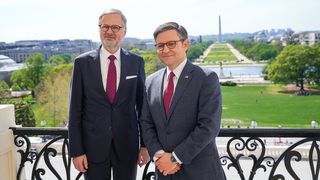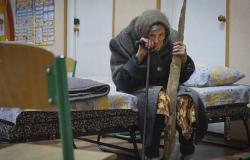When we watch Petr Fiala in the White House or in the US Congress, we see a competent politician. When we watch him convince European leaders in Brussels to contribute to a munitions initiative to help Ukraine, we see a Czech prime minister who commands the respect of others.
Or when we watched him ride the train to Kiev in bulletproof vest and helmet – three weeks after the start of the Russian attack – we saw courage and perhaps felt pride. International politics is obviously something that the Czech Prime Minister enjoys, that he understands and where he demonstrates excellent intuition.
And now the cut. When we watch the same Petr Fiala in a rare debate with angry people on the street somewhere in the Czech Republic, we suddenly see a politician who cannot simply explain high prices in shops or convincingly defend government actions.
In the Czech Republic, barely 20 percent of people trust him personally and his government, which are the lowest figures in the world. On the contrary, his calm strength and the story of a professor-intellectual who managed to defeat a populist-billionaire are impressive abroad, so much so that he is even offered high posts at the head of the EU.
Why is it that Petr Fiala – to put it in a filmic exaggeration – is a villain at home, while a hero outside? Why is the same quality that is praised abroad as balance, at home we see it as indecisiveness?
“Flying High”
“The problem of domestic mistrust is that Petr Fiala is flying high, so to speak,” says public opinion expert Jan Herzmann. “He cannot empathize well with the thinking and problems of people with a lower social status and lower education. He cannot speak in such a way that these people understand him, he cannot win them over to his side. He just doesn’t know how to go around Masaryk with people on a zejdlík.”
And it’s actually to be expected. Petr Fiala is an intellectual who entered politics from academia, before that he was rector of Masaryk University in Brno. After all, fellow party members in his ODS nickname him “professor”, which he certainly likes.
“He fights with domestic politics because it cannot do without direct contact with the voter, without understanding his needs and moods. This kind of empathy is lacking in Fial. He didn’t need it at university, and it’s hard to learn after fifty,” says political analyst Lukáš Jelínek. “He has his own style of work, demeanor, dressing – and none of this brings him close to the average voter.”
Although the domestic audience appreciates Fiala’s competence in foreign policy in sociological surveys, for most people it is a less important topic in the order of importance. More important are prices in stores or utility bills. The opposition also portrays the prime minister as arrogant, elitist or incompetent.
If his critics are to find at least one positive in domestic politics, it is his ability to hold together a five-party government. It’s just how Fiala settles disputes, suppresses discontent and seeks compromises within a very varied government coalition.
“However, this side of the matter is relatively rare to see from the outside and it is difficult to sell it well to the public,” says political scientist Lubomír Kopeček, adding: “Already within the university, as rector, he also acted as a moderating player between various interests. It is good not to underestimate this, because when the accounts are settled at the end of the term, he will have the bonus of a prime minister who managed to manage something difficult to manage”.
Consequences of bloody compromises
His partner and competitor at the same time, the leader of the STAN movement, Vít Rakušan, speaks about not underestimating the professor on his home field. He compares Fiala to a marathon runner who knows how to spread his strength and doesn’t collapse like others from a crisis at the twentieth kilometer. “I think that the perception of Petr Fiala is clearly not bad even here at home,” says the Austrian.
The reality is that Fial’s five-coalition government can’t even do anything well. Logically, opposition voters will always be dissatisfied. And the sometimes bloody compromises, as happened for example with the consolidation package, are not understood by the supporters of even one of the five governing parties.
In today’s politics, where many rely on shorthand messages on social networks and populism is on the rise all over the world, as if an intellectual does not fit in at all. “Fiala is neither a brawler nor a camp speaker, so he’ll be pocketed by some finger-salivating loudmouth. After all, this is another of his hallmarks – he is an essential opponent of populism. He proves this by his actions, even in moments when it would be useful to listen to the voters,” says Lukáš Jelínek.
Photo: Government Office
The whole situation, when Fiala is perceived as a star abroad and almost misunderstood at home, is somewhat reminiscent of the story of Václav Havel – although, like any comparison, it does not quite fit. Because of his historic role in helping Ukraine, today’s prime minister even earned the praise of the editor-in-chief of Respekt magazine Erik Tabery.
“Petr Fiala has crossed his shadow. He subscribed to the Masaryk and Havel tradition, which could be briefly named – it doesn’t matter how big our state is, but we bear our share of responsibility for Europe and the world, if we can help make it better, we should do it. Because it will come back to us,” Tabery wrote in the comments.
A meticulous and cynical systematist
Of course, Fiala will never be as famous as Havel. But, like him, he is convinced that the most important things for the Czech Republic take place in Brussels, Berlin or Washington – and he directs his efforts there as a matter of priority. Which, of course, some people either don’t understand at all, or even see in it contempt for the everyday concerns of ordinary people.
In addition, one illustrative story. When Václav Havel returned from the NATO summit in Madrid in July 1997, where the Alliance offered membership to the Czech Republic, Hungary and Poland thanks to him, his colleagues urged him at the airport that he must now quickly go to Moravia, where there are major floods. President Havel, saying “I have now provided the country with security for decades”, did not really understand their demand.

“While Havel acted largely on the basis of instinct and a value compass, Fiala is a careful, somewhat cynical systematist who turns the helm of foreign policy thoughtfully and cold-bloodedly, especially on the basis of historical experience,” says analyst Lukáš Jelínek, who incidentally is Fiala’s student from the Brno University of Political Science . “Today I realize that he is putting into practice what he was already lecturing us on a theoretical level”.
Apart from instinct, Petr Fiala relies on his knowledge in foreign policy and diplomacy. He has an academic background in history, philosophy and international relations. He knows very well the European nations, their strengths and weaknesses – he can at least impress his colleagues in the EU. He reads a lot of German, British and French authors, knows the history of conservatism, has excellent contacts all over Europe.
“When all this is combined with practitioners who shape Czech foreign policy today, such as the prime minister’s adviser Tomáš Pojar or the president’s adviser Petr Kolář, it results in Fial’s very high competence and the successes of the entire government in the international field,” Jelínek explains the magic of the fifty-nine-year-old professor’s success abroad.








